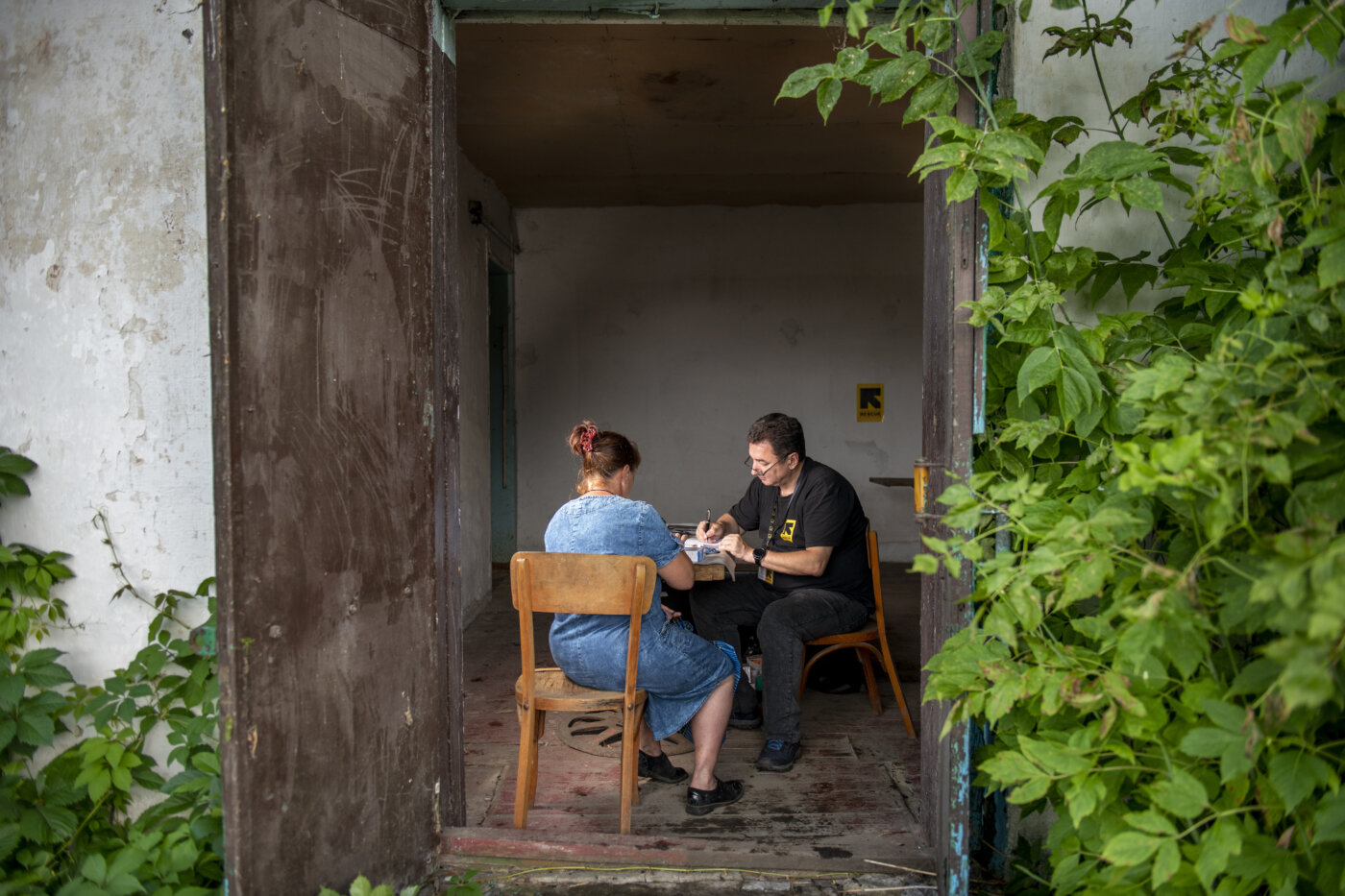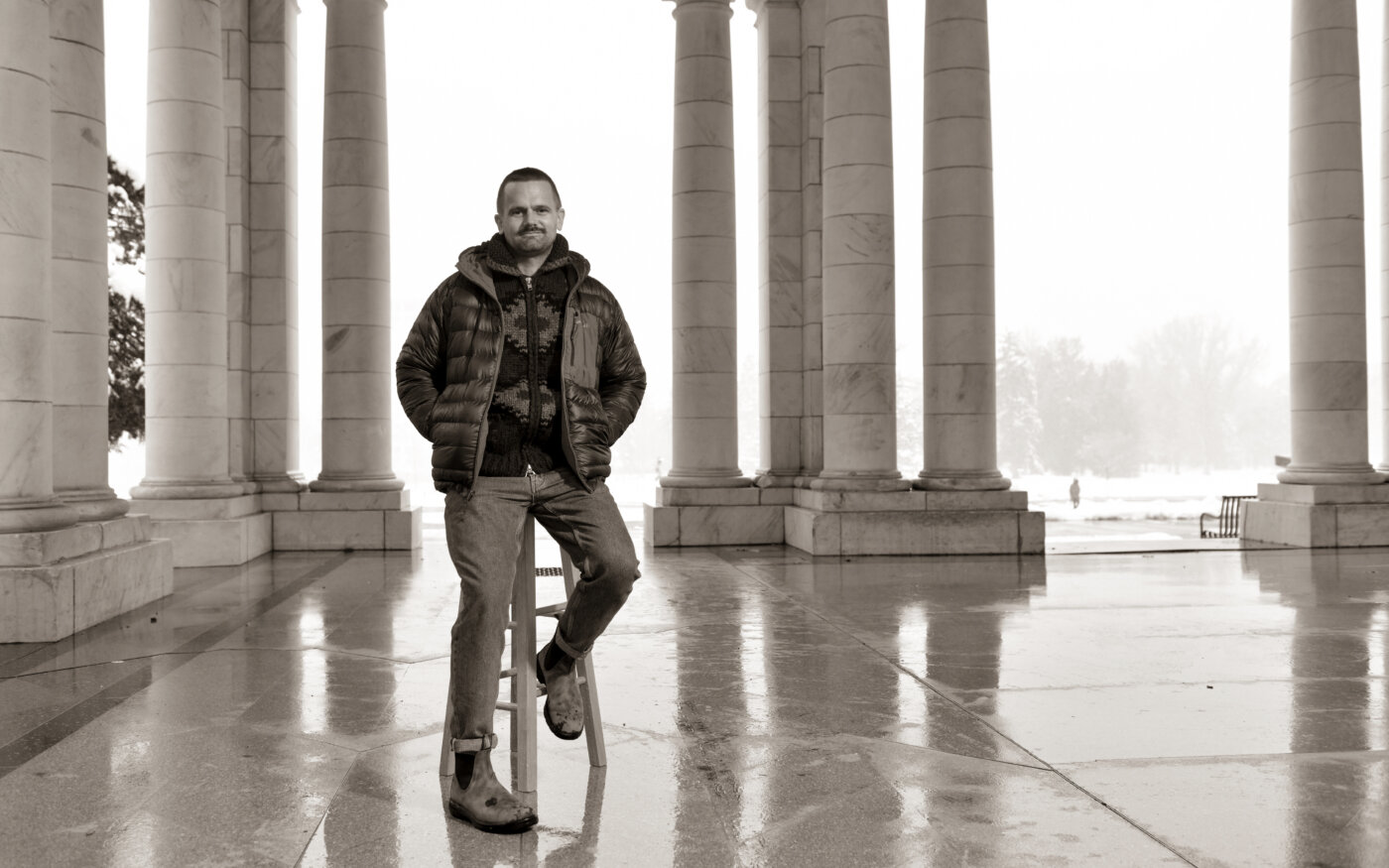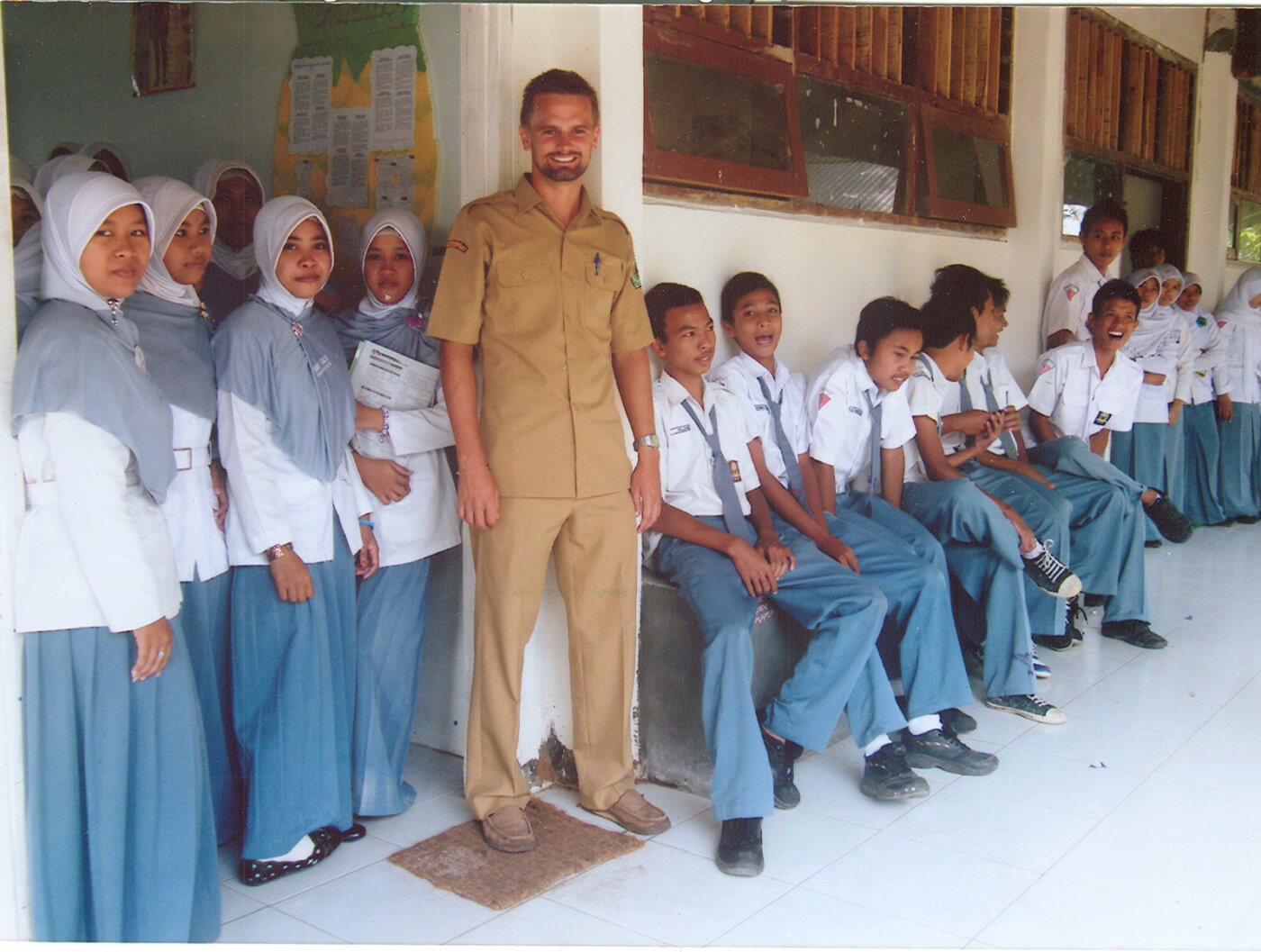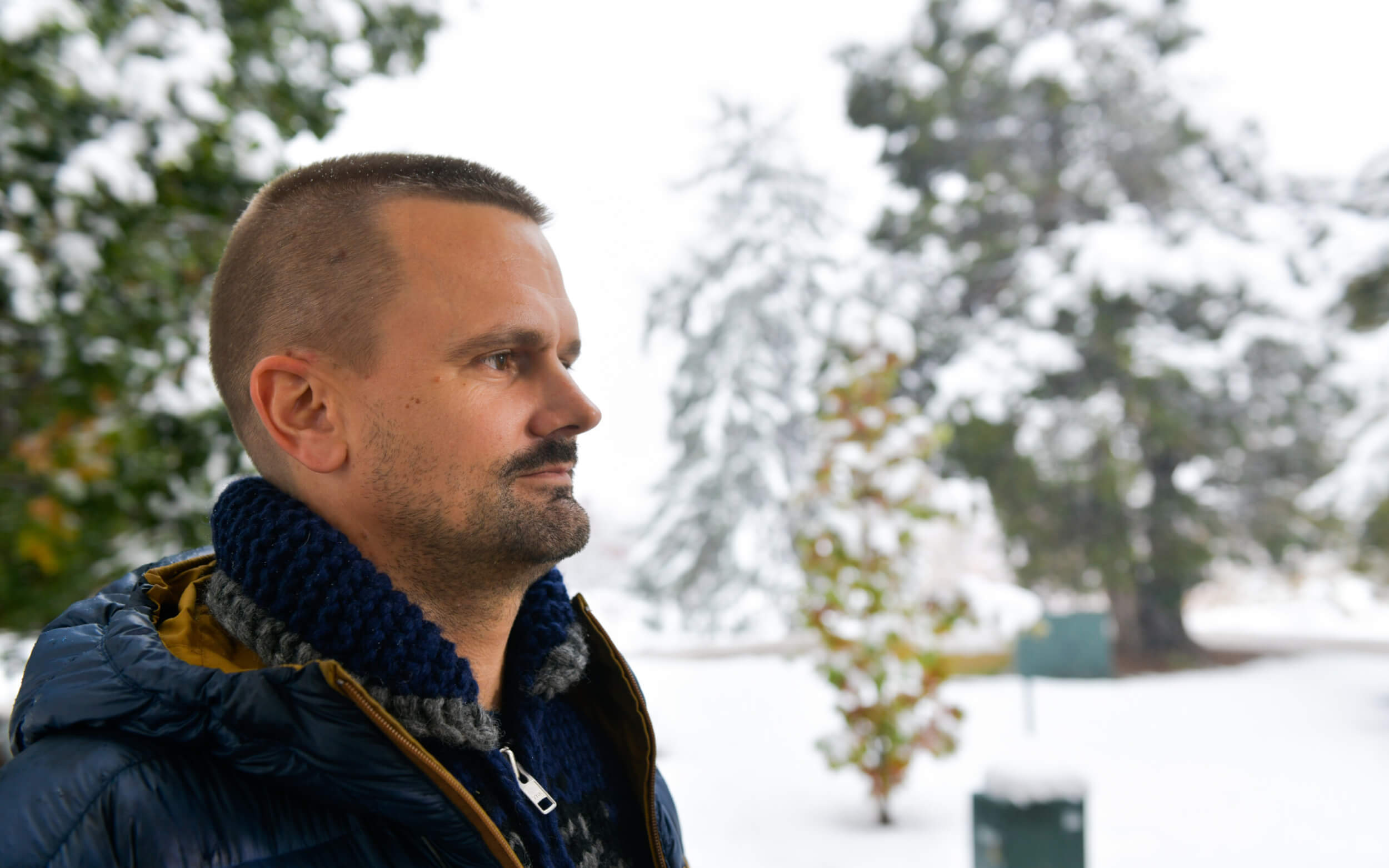As Scott Lea ’02 reflects on concluding a year-long contract serving as Country Director for the International Rescue Committee (IRC) in Ukraine in December 2024, he takes pains to acknowledge the courage of the 300-plus Ukrainian staff members he has helped lead during 12 months at the center of what has become the largest displacement crisis in Europe since World War II.
“My colleagues and their families won’t get to leave the country at the end of the year, like I will,” he says on a Zoom call from Kyiv. “They will keep putting themselves at risk, taking on more work that only becomes harder to do, and facing immediate or vicarious trauma daily. I have no illusions that my experience of this conflict has been the same as theirs. After two-and-a-half years of war, they are exhausted.”
Indeed, during his time in Ukraine, from which six million people have fled since the conflict began in February 2022 and in which millions more have become “internally displaced persons” (IDPs) in need of urgent humanitarian assistance, Lea explains, the term that might be most apt to describe life in this former Soviet republic is “cognitive dissonance.”
On the one hand, he relates, his apartment, like the IRC’s main office, is centrally located in Kyiv, “a wonderful European city with incredible culture, amazing restaurants. I have friends who still go to the opera or ballet. Life continues, and in many ways it’s great.”
On the other hand, air alarms sound regularly in Kyiv and in the IRC’s field offices in cities such as Kharkiv, Odesa, and Dnipro, and especially in those eastern towns and villages most vulnerable to Russian missiles and drones, “Life has become much more difficult, with a far larger military presence, air alarms, and near-daily missile or drone strikes. And as you get close to the front line, things are just incredibly hard due to interrupted services, damaged infrastructure, and power outages.”

Lea relates the story of one elderly woman he met outside Kherson, who lost her husband and home and was forced to move to a second family house for which she didn’t have the documentation to prove ownership. “She lives alone now, without her community or her support system.” Or there is Lea’s colleague in Kharkiv, the embattled city of one million near the Russian border, who took his children to a park for an outdoor birthday celebration, only to have a Russian missile streak overhead during the festivities. “He told me it ruined the party, and I thought, ‘of course it does.’”
“We have been celebrating the resilience of Ukrainian people for more than two years,” Lea goes on, “and it is absolutely something that should be celebrated. But people here have had to be so resilient for so long, so many communities have depleted all their resources to support IDPs, whether extended family staying with relatives or large centers being converted to take care of the displaced. But just one drone or missile strike can mean another acute humanitarian crisis at almost any moment.”
This is why the work of the IRC remains vital to Ukraine, Lea makes clear. The nonprofit, headquartered in New York City and with local offices located in Denver and around the world, has been on the ground in Ukraine since early 2022, delivering critical health care services and supplies, essentials to keep people warm during cold winters, support for women and children, and cash assistance to IDPs. The vast range of services that the IRC makes available across the arc of displacement—from providing care for those suffering from trauma and violence to offering education and case management for children, women, and other at-risk groups inside Ukraine, as well as resettlement services in host countries in Europe and in the United States—is a reflection of the tremendously deep and complex impacts Ukrainians continue to experience as a result of the ongoing conflict.
At the IRC, says Lea, “We stand with the people of Ukraine to ensure the abnormal does not become a norm, that we do not become desensitized to the horrors of war, and that the ongoing human tragedy does not cease to evoke a global response. Solidarity has no expiration date, and the international community must ensure this is not a forgotten crisis.”

Solidarity is one word to describe the IRC’s mission in Ukraine; another is empathy. But not the kind of empathy that sees the vulnerable as mere “recipients for assistance,” as Lea puts it. “In humanitarian work, the road to hell is paved with good intentions. I have seen both individuals and organizations try so hard to help those who are suffering by imposing their own solutions. But just wanting to do good is not enough,” he recounts.
“Humility is essential—recognizing people’s full humanity, not just their vulnerabilities, but also their strengths and resourcefulness. Our job is to support and leverage all that our clients bring to the table: They have already been working to take care of themselves and their communities under the most extraordinary circumstances.”
A clear-cut path
At Colorado Academy, it was an English class reference to hell that perhaps showed Lea the way toward the kind of “empathy work” that seeks to understand the aspirations of others and elevate their work.
Reading Dickens’ Oliver Twist during a Senior year English elective taught by the legendary Anne Strobridge, Lea and his classmates analyzed a scene in which the book’s hero is left behind, crying helplessly, when a band of fellow London orphans abandons him by escaping out a window. What, Strobridge wanted to know, did the class feel during this scene: empathy or contempt?
While his classmates overwhelmingly answered that it was empathy they felt toward the pathetic Twist, Lea insisted what he experienced was more like contempt. “I was irritated with Oliver. He just sat there crying when he could have done something for himself; he could have escaped like the other orphans.” Strobridge disagreed, telling her student jokingly, “Scott, you’re going straight to hell. But you’ll be in line behind me.”
“I wasn’t offended at all,” Lea hastens to note. “Ms. Strobridge was nothing if not direct; what she said was perfectly fair.” But the scene stayed with him, and it would inform choices made in college and throughout his career to ally himself with causes that, rather than merely sympathizing, work to offer dignity and support to those fighting to survive historical moments that have overwhelmed their coping strategies and support systems, often when they are already marginalized and made vulnerable by global or local structures.
Lea’s passion was already visible when he was a Middle School and Upper School student at CA. “I was the kid who, if we were assigned a research project of our own choosing, I would pick something like the Cambodian genocide [the systematic persecution and killing of Cambodian citizens by the Khmer Rouge during the 1970s] or the My Lai massacre [the 1968 mass murder of unarmed civilians by the U.S. Army during the Vietnam War]. The fact that I was given the time and the space and the support to do that at CA is extraordinary.”
It may sound trite, Lea continues, but CA’s insistence on nurturing critical thinking, its openness to students questioning almost anything, was essential. Those habits would prove vital as Lea forged a path toward working with Médecins Sans Frontières (MSF – Doctors Without Borders), the international relief agency that had stood as a model for him since early on. “The United States doesn’t offer many great entry points into humanitarian work, so with help from my teachers and college professors I created my own.”

Lea earned a BA in International Relations and Human Rights at New York University, and later obtained a master’s degree in International Health at Tulane University’s Celia Scott Weatherhead School of Public Health and Tropical Medicine. Following a two-year stint in the Peace Corps, teaching English in Indonesia, he was able to get his foot in the door with the IRC in Iraq and Turkey, before finally landing at MSF in 2016. In various roles there, he spent time in South Sudan, Sierra Leone, Nigeria, and Sudan before returning to the IRC, where he served in a variety of positions in central Africa and Central America before taking the one-year appointment as Ukraine Country Director in 2024.
“I consider myself very lucky to have found such a clear direction—even if I didn’t always know how to get there,” Lea says. “I have always gravitated toward the guiding principle that informs all humanitarian work: Keep people alive, and help them live with dignity. That has made the work feel more clear-cut; I know it’s important and that I’m contributing something.”
A common humanity
Perhaps surprisingly, Lea never uses the word “altruism” when talking about the things he has spent his career doing. “With the possible exception of Mother Teresa, I don’t think altruism exists,” he states. “I get a lot out of this work: I get to have incredible experiences in amazing places, meet wonderful people, feel fulfilled at what I’m able to help them achieve. I’m not doing this as a service or out of charity; it’s a career, and I enjoy it.”
One of Lea’s greatest sources of irritation is encountering outsiders who equate humanitarian work with “giving free handouts.” “We collaborate with so many partner organizations, with government officials, social workers, teachers, neighbors—all people who are working twice as hard as the rest of us to take care of themselves and each other. That’s what makes humanitarian work so rewarding and interesting and challenging.”
“Even people I’m close to sometimes don’t understand why the U.S. funds humanitarian work and why it is important. It’s not about putting those we’re helping on a pedestal or treating them like glass sculptures. My Ukrainian staff are my colleagues, just like colleagues anywhere else. We go out to lunch together and talk about our families. At the most basic level, we are the wealthiest country on Earth and have the resources to recognize our common humanity and assist people because they need it in a crisis.”
When he was in the Third Grade at CA, Lea relates, he would sometimes sit alone at recess, avoiding other children. “I wasn’t a very social person; I’m probably still not,” he admits. But one day, his teacher, Terri Otto, took him aside and gently told him, “Scott, when the others invite you to play and you say no, then you’re not going to make many friends.” He took the message to heart, and now, there are days when he finds he still has to tell himself, “Sometimes you have to say yes to things, Scott”—yes to speaking in public (which he learned how to do at CA), yes to writing and communicating important messages with clarity and urgency (ditto), yes to celebrating, of all things, other people.
His job, Lea underscores, is not to swoop in with his master’s degree and teach a community how to live their lives or recover from a crisis—they already know how to do that. It is “to support my team so that we as an organization are being as efficient as possible with the resources we have available to support crisis-affected communities, reducing the burdens Ukrainians face so that they can do their work—which is already hard enough.”
Lea observes, “Where empathy comes into this work is being able to recognize the humanity in people and think, ‘That is an area where I want to contribute’—not because they are helpless (they are not); not because they look like me; not because they’re in my hometown or the next town over. It doesn’t matter where they are or what they look like or what their background may be. Their humanity is the same as mine, and if I have the interest and the competencies and the experience to help support them in a time of crisis, then yes—it is incredibly gratifying to be able to do that with empathy.”
